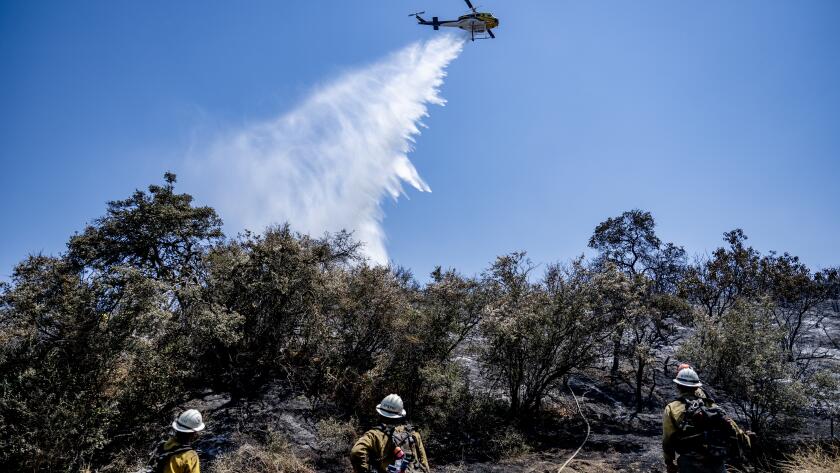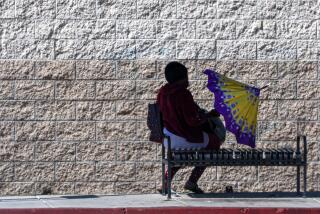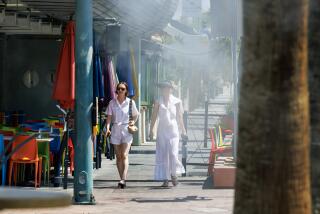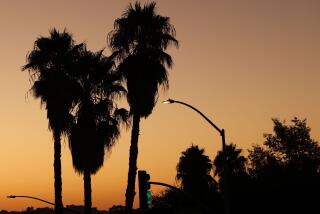As heat wave scorches California, firefighters make headway against wildfires
- Share via
As a heat wave broke records across California and sent residents scrambling for relief, firefighters were making progress in battling several wildfires.
- Share via
Firefighters in Riverside County made progress in battling four wildfires Sunday as a heat wave broke records across the state and sent residents scrambling for relief.
The largest of the fires, the Rabbit fire, burning in the area of Lakeview south of Moreno Valley, had consumed 7,600 acres and was 25% contained, authorities said Sunday night. The blaze threatened more than 150 structures, and steep terrain made it slow going, but CalFire spokesperson Rich Cordova said firefighters made “great progress” overnight.
One woman suffered severe burns and was taken by helicopter to a burn center, Cordova said. She was rescued near where the fire started on Gilman Springs Road, he said.
It was not immediately clear what sparked the Rabbit fire, which began Friday, or others burning in Riverside County, but Cordova said heavy winter rains resulted in abundant grasses and “any little spark could cause the devastation of a wildfire.”
“Residents need to be more cautious” when pursuing recreation or even landscaping activities, he said, because “any little spark, and a fire will take off.”
Firefighters were also making progress against other fires burning near Moreno Valley. The Reche fire, which burned 437 acres in an unincorporated area north of town, had reached 80% containment by Sunday night, officials said. Video from the scene showed at least one structure engulfed in flames, but it was unclear whether any others had been damaged.
The Highland fire, which has been burning in the Beaumont-Banning area, was 95% contained and had burned 105 acres. Evacuations in that area have been lifted. And the Gavilan fire, which burned 338 acres, was 50% contained.
Temperatures on Sunday hovered near triple digits in the San Fernando Valley and reached them in the Antelope Valley. Topanga reached a high of 98 around noon, National Weather Service data showed, and Lancaster peaked at 109.
In Los Angeles, city leaders designated four Recreation and Parks facilities to serve as community “cooling centers” until 9 p.m. Sunday: Highland Park Recreation Center in Highland Park, Mid Valley Senior Center in Panorama City, Canoga Park Senior Center in Canoga Park and Fred Roberts Recreation Center in South L.A.
Inside the Highland Park Recreation Center, it was a brisk 72 degrees — or at least it was until the power went out about 12:15 p.m. A downed power line a block away knocked out the electricity to the recreation center and to the nearby Arroyo Seco Regional Public Library, one of several libraries that were also serving as a cooling center.
“So much for our cooling center!” said Benjamin Newman, standing in the center’s darkened indoor basketball court, where he had been playing with his son, 4-year-old Brayden Hutchens.
Newman, whose apartment has a single window air-conditioning unit, said city officials had not opened up enough cooling centers to serve the population, particularly the elderly.
The city also needs to do more to publicize them, said Newman, who learned that his neighborhood had such a resource only after a television news crew approached him and his son on the nearby playground earlier in the day to ask them about it.
In Panorama City, the temperature had climbed above 90 degrees by 12:45 p.m., but no one had yet visited the cooling center in the Sepulveda Recreation Center, said David Anguiano, a recreation coordinator for the Los Angeles Department of Recreation and Parks.
Inside, long tables were set up on a basketball court to accommodate people who needed a respite from the heat. There were enough chairs for more than 40 visitors. All were empty.
Tamar Kasparian, a recreation assistant for the parks department, was stationed near two large coolers filled with water bottles should anyone want them.
The air conditioner was whirring so hard that at one point, Kasparian said, she had briefly sneaked out into the heat.
“I had to step out because it got pretty chilly in here,” she said.
The heat did not deter players on a men’s recreation league baseball game underway nearby.
Jose Vazquez, 17, watched the game from behind the third-base dugout. He said the heat wasn’t too bad — as long as he stood in the shade. But it was a different story in the sun, said Vazquez, gesturing at the infielders.
“That’s why everyone prefers to get the three outs fast,” the North Hollywood resident said.
In downtown Los Angeles, many families shunned cooling centers in favor of another option: the public fountain and splash pad at Grand Park.
More than a dozen children darted back and forth through the shoots of water, stopping occasionally to rejoin their parents, who were nursing coffee drinks at the nearby hot-pink tables.
Mary Ra, 29, said the high temperatures had prompted her to bring her 4-year-old, Ava, down to play in the fountain for the first time.
“She loves it,” Ra said. “She was hugging the ground; she was hugging the waterfall.”
Yali Caballero, 45, said she brought her son, Jair Salas, 10, to keep from “blasting the A/C at home all day.” Salas, who has been to the fountain “countless” times, said his favorite part was the water cascading down the walls.
“It just completely splashes you,” he said. “It’s really refreshing.”
A ridge of high pressure centered over the western U.S. is causing the hot weather, which began Wednesday in Southern California. The particularly stagnant warm air mass is now centered over California, trapping heat near the surface — known as a “heat dome,” said Elizabeth Adams, a meteorologist with the National Weather Service’s San Diego office.
Several temperature records were broken Saturday, according to the weather service. In the Antelope Valley, Lancaster hit 112, Palmdale reached 111 and Sandberg reached 102. Records were also broken in Paso Robles in San Luis Obispo County, where temperatures reached 109, and in Santa Barbara County’s New Cuyama, which hit 105.
Triple-digit temperatures were seen across the state. In Death Valley, it was 124 by Saturday evening. In Palm Springs, it was 115, and Redding was 109.
More to Read
Sign up for Essential California
The most important California stories and recommendations in your inbox every morning.
You may occasionally receive promotional content from the Los Angeles Times.














